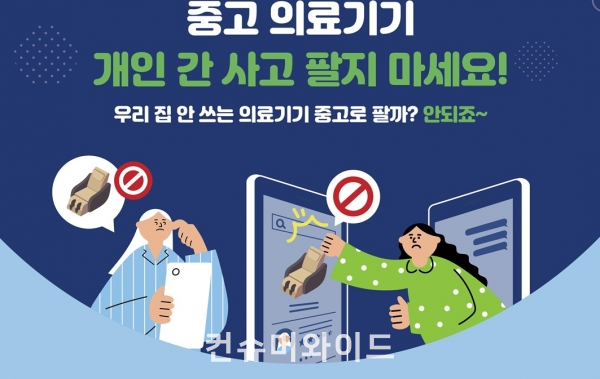
[Consumerwide - Jinil Kang Reporter / Yohan Bok Reporter] Customers seem to pay more attention to second-hand transactions, which are one of the easiest and most familiar markets, in the midst of a hard economy, along with a rational consumption trend amongst the younger generation.
In particular, the online second-hand market, which consumes less shopping time and space, grew six times by 24 trillion won in 2021 compared to 2008, which recorded 4 trillion won. The monthly active users of a second-hand online platform in Korea counted 22 million last year. However, the problem lies in that items that are prohibited or limited between individuals, including domestic and overseas recalled products, medications, and medical equipment, are distributed through the platform. According to the current law, medical equipment transactions are exclusively allowed by registered medical device sellers, not individuals, due to the risk of bacterial infection and accuracy or function issues. You may commit a crime unintentionally, even though you intended consumption value in the first place.
However, many consumers do not even know whether there are items that are banned for second-hand personal transactions. Referring to 2022 Consumer recognition research announced by KCA, 54.1% of people answered that they know about banned items for second-hand platform transactions, whereas 45.9% of people answered they don't, which means that there can be quite a number of medical equipment transactions in the second-hand market unintentionally.
For this reason, KCA is facilitating this campaign to enhance consumer safety recognition and make a safe medical equipment consumption environment. However, it won't mean much unless the consumer himself stops purchasing any of them. If one is planning on value consumption, you have got to remember this. If they stop purchasing, there won't be any sellers in the market.
- [Reporter's note] The online luxury shopping platform industry is lukewarm in practicing ESG management, but Mustit.
- [Reporter's note] Burger King is losing the battle of performing business ethics. Why not learn from McDonald's?
- [Reporter's Note] After one year of a trucking business owners' strike in Korea... ESG is not irrelevant to financial status, as far as to the profit and loss statements of the businesses in the sup
- [Reporter's Note] Chuseok delivery failure has been repeated every year... There has got to be a fundamental change.
- [Reporter's Note] Burgerking is having a serious ethical problem beyond sanitation issues.
- [Reporter's Note] 3 thousand won per liter of milk from Oct in Korea.. Would imported sterilized milk products be an option?
- [Reporter's note] Another victim of SNS scams, including Tiffany&Co. jewelry (85% sales)... How long has the consumer got to endure alone?
- [Reporter's note] It's not easy to sue restaurants that force you to leave a tip... What would be the right consumer culture?
- [Reporter's note] Distribution industries have got to collect cold reserved bags of giftsets during Chusuk season.... This is a way to lead to value-based consumption.
- [Reporter's Note] Is it not a time for grief yet? ... After one year since the deadly Halloween disaster at Itaewon, Hongik University Street is now full of people celebrating Halloween
- [Reporter's Note] Dark patterns on shopping websites that interrupt rational consumption value have got to be out
- [Reporter's Note] The Ministry of Environment is cancelling regulations for disposable products, which might slow down environmental policy. There has got to be an alternative
- [Reporter's note] There has been no ESG activity at Polestar for the last two years since entering the Korean market... They've got to change

